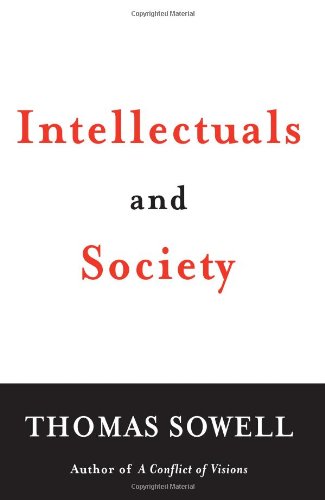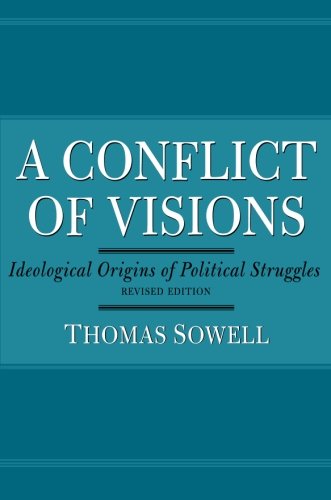Recently by Thomas Sowell: Democrats Bite Democrats
A graduating senior at Hunter College High School in New York gave a speech that brought a standing ovation from his teachers and got his picture in the New York Times. I hope it doesn’t go to his head, because what he said was so illogical that it was an indictment of the mush that is being taught at even our elite educational institutions.
Young Justin Hudson, described as “black and Hispanic,” opened by saying how much he appreciated reaching his graduation day at this very select public high school. Then he said, “I don’t deserve any of this. And neither do you.” The reason? He and his classmates were there because of “luck and circumstances.”
 Intellectuals and Society
Best Price: $6.98
Buy New $49.75
(as of 04:25 UTC - Details)
Intellectuals and Society
Best Price: $6.98
Buy New $49.75
(as of 04:25 UTC - Details)
Since Hunter College High School selects its applicants from the whole city on the basis of their test scores, “luck” seems a strange way to characterize why some students are admitted and many others are not. If you can’t tell the difference between luck and performance, what has your education given you, except the rhetoric to conceal your confusion from others and perhaps from yourself?
Young Mr. Hudson’s concern, apparently, is about what he referred to as the “demographics” of the school — 41 percent white and 47 percent Asian, with blacks, Hispanics and others obviously far behind. “I refuse to accept” that “the distribution of intelligence in this city” varies by neighborhood, he said.
 A Conflict of Visions:...
Best Price: $14.97
Buy New $14.99
(as of 04:25 UTC - Details)
A Conflict of Visions:...
Best Price: $14.97
Buy New $14.99
(as of 04:25 UTC - Details)
Native intelligence may indeed not vary by neighborhood but actual performance — whether in schools, on the job or elsewhere — involves far more than native intelligence. Wasted intelligence does nothing for an individual or society.
The reason a surgeon can operate on your heart, while someone of equal intelligence who is not a surgeon cannot, is because of what different people actually did with their intelligence. That has always varied, not only from individual to individual but from group to group — and not only in this country, but in countries around the world and across the centuries of human history.
One of the biggest fallacies of our time is the notion that, if all groups are not proportionally represented in institutions, professions or income levels, that shows something wrong with society. The very possibility that people make their own choices, and that those choices have consequences — for themselves and for others — is ignored. Society is the universal scapegoat.
If “luck” is involved, it is the luck to be born into families and communities whose values and choices turn out to be productive for themselves and for others who benefit from the skills they acquire. Observers who blame tests or other criteria for the demographic imbalances which are the rule — not the exception — around the world, are blaming whatever conveys differences for creating those differences.
They blame the messenger who brings bad news.
If test scores are not the same for people from different backgrounds, that is no proof that there is something wrong with the tests. Tests do not exist to show what your potential was when you entered the world but to measure what you have actually accomplished since then, as a guide to what you are likely to continue to do in the future. Tests convey a difference that tests did not create. But the messenger gets blamed for the bad news.
 Similarly, if prices are higher in high-crime neighborhoods, that is often blamed on those who charge those prices, rather than on those who create the higher costs of higher rates of shoplifting, robbery, vandalism and riots, which are passed on to those who shop in those neighborhoods. The prices convey a reality that the prices did not create. If these prices represent simply “greed” for higher profits, then why do most profit-seeking businesses avoid high-crime neighborhoods like the plague?
Similarly, if prices are higher in high-crime neighborhoods, that is often blamed on those who charge those prices, rather than on those who create the higher costs of higher rates of shoplifting, robbery, vandalism and riots, which are passed on to those who shop in those neighborhoods. The prices convey a reality that the prices did not create. If these prices represent simply “greed” for higher profits, then why do most profit-seeking businesses avoid high-crime neighborhoods like the plague?
It is painful that people with lower incomes often have to pay higher prices, even though most people are not criminals, even in a high-crime neighborhood. But misconstruing the reasons is not going to help anybody, except race hustlers and politicians.
One of the many disservices done to young people by our schools and colleges is giving them the puffed up notion that they are in a position to pass sweeping judgments on a world that they have barely begun to experience. A standing ovation for childish remarks may produce “self-esteem” but promoting presumptuousness is unlikely to benefit either this student or society.
Thomas Sowell is a senior fellow at the Hoover Institution at Stanford University. His Web site is www.tsowell.com.




